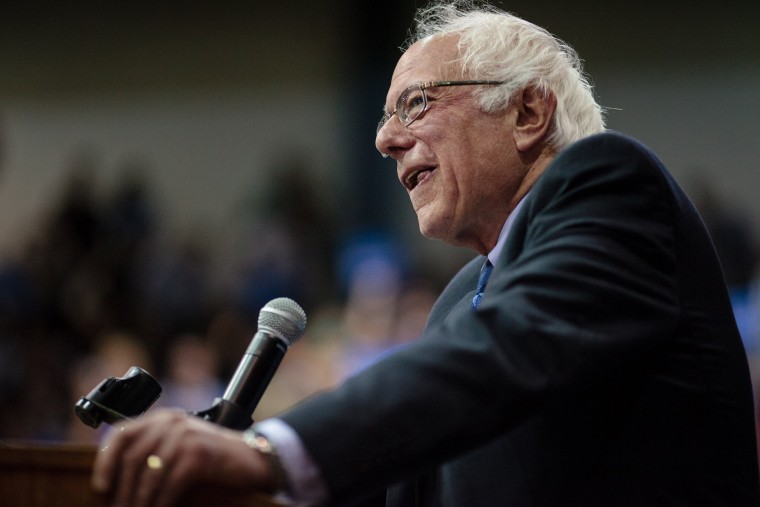It's safe to say May hasn't gone quite as well as Bernie Sanders and his supporters had hoped. He needed landslide victories in several primaries, and he came up short. After steadily gaining on Hillary Clinton in national Democratic polls for months, the senator has
seen his support slip in recent weeks. In Nevada, Sanders' supporters caused a near-riot at the state Democratic convention, based on allegations of party wrongdoing that have
struggled to withstand scrutiny.
Sanders' candidacy has had some highs and some lows, but all things considered, this hasn't exactly been a month to remember. For his legions of supporters, it's no doubt discouraging.
The race for the Democratic nomination, however, still has about a month to go, and the
New York Times reports that Team Sanders isn't backing down, delegate arithmetic notwithstanding.
Defiant and determined to transform the Democratic Party, Senator Bernie Sanders is opening a two-month phase of his presidential campaign aimed at inflicting a heavy blow on Hillary Clinton in California and amassing enough leverage to advance his agenda at the convention in July -- or even wrest the nomination from her.
It's at this point when Sanders and campaign operation start to run into a "then what?" problem.
According to the Times' piece, for example, Team Sanders believes it may yet win the California primary, where polls show him trailing, which might have "a psychological impact" on Democrats. OK, but then what? If the idea is that Democratic insiders will ignore the will of the voters and the delegate count because of one primary result, awarding Sanders the nomination despite his second-place finish, there's no reason to believe such a scenario is plausible.
The same article said Team Sanders is willing to hurt Clinton, on purpose, even as the general-election phase gets underway. OK, but then what? There's still no reason to believe this will prompt party officials to override the primary and caucus results.
A Sanders supporter told the Times, "We want to have progressive values and socialism on the convention's agenda." OK, but then what? It's not clear how, exactly, one puts "socialism" on the "agenda," but even if that were possible, what happens afterwards?
Tad Devine, a top Sanders strategist,
told the
Washington Post's Greg Sargent yesterday that the Sanders campaign may ask for some changes among convention committee assignments. OK, but then what? What are the practical effects of changing which Democrats sit on which convention committees, and why should a second-place candidate dictate convention committees' membership?
There are rumors about Sanders supporters preparing for civil disobedience and organized disruptions at the Democratic convention itself. OK, but then what? History has shown that convention protests, even intra-party protests, can lead to meaningful change, but even if progressive activists literally started fires on the convention floor, in a display of violent catharsis, how does that bring Sanders and his allies any closer to their goals?
The Times article added this key paragraph:
[Sanders'] newly resolute attitude is also the cumulative result of months of anger at the national Democratic Party over a debate schedule that his campaign said favored Mrs. Clinton; a fund-raising arrangement between the party and the Clinton campaign; the appointment of fierce Clinton partisans as leaders of important convention committees; and the party's rebuke of Mr. Sanders on Tuesday for not clearly condemning a melee at the Nevada Democratic convention on Saturday.
It's worth noting, however, that the national Democratic Party agreed to expand the debate schedule, and it offered Sanders literally the identical fundraising arrangement it struck with the Clinton campaign. Democratic officials also worked to make sure Sanders appeared on the New Hampshire and D.C. primary ballots, even after procedural and legal questions arose surrounding his eligibility -- steps the DNC wouldn't have taken if it were trying to rig the process against him.
There's still time to avoid scenarios that could prove costly in the fall, but not a lot of time. Sanders believes, accurately, that he has some leverage: if he's not satisfied with how the process unfolds in the coming weeks, the senator can sabotage the party's ticket and elect President Trump. What's less clear is what he'll demand in exchange for his support.
